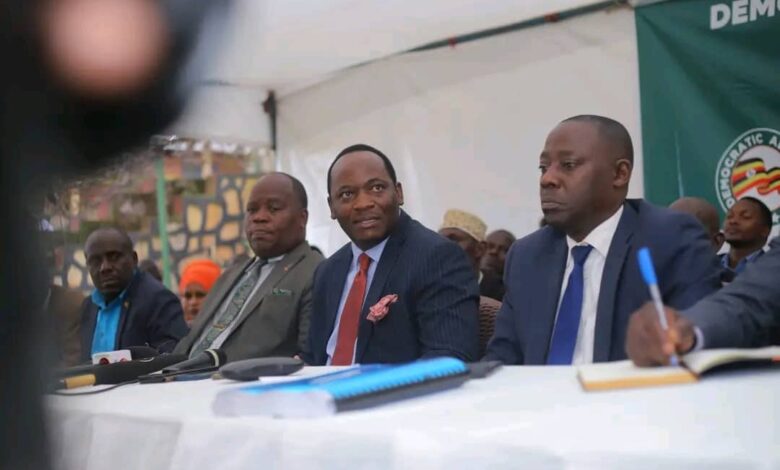Democratic Alliance Not A Political Party, But A Civic Platform, Mpuuga Clarifies
Kampala| FileFactsUg

Nyendo-Mukungwe MP Mathias Mpuuga, the National Coordinator of the Democratic Alliance (DA), Monday, 16th, December 2024, addressed the presser for the first time since the grand unveiling of the Democratic Alliance Civil Platform, on December 6th, 2024.
The Parliamentary Commissioner Mpuuga explained that the press conference was called to address four key issues that required follow-up from the interaction with the world on December 6th, 2024.
At their offices in Namirembe, key members of the DP block, Lubega Mukaaku, Michael Mabikke, and over 50 members of the DA, flanked the usual smartly dressed Mpuuga who began by appreciating the massive turnout by the media, and the nation at large to listen to the DA’s announcement and relay their approach on politics, governance, and leadership in Uganda.
“Beginning with the light one is to appreciate you [the media] and the whole nation for the massive turn up to listen to us, to try and understand us, and also relay our considered approach on how we intend to approach matters of politics, governance, and leadership in this country going forward,” Mpuuga said.
Misconstrued as a new political party by a section of Ugandans, Mpuuga also clarified that the DA is not a political party, but a civic platform.
“I have heard people including well-schooled media practitioners congratulating me for launching a political party, and I thought it necessary to clarify that we did not launch a political party, but we launched a civic platform, a non-partisan and all-inclusive civic platform to engage in two major issues,” he explained.
The first issue Mpuuga addressed was the DA’s intention to engage with all registered political platforms.
“As a national coordinator, I have written to all registered political platforms to communicate to them in writing how we want to work with them and invite them for an interaction,” he said.
Mpuuga also announced that the DA will embark on a national outreach program, beginning January 2025.
“At the turn of the year, we intend to go on the road to the entire country. We shall reach to every width and length of this country to speak to the people on two issues that are the main to our public engagement,” he said.
The two main issues the DA will focus on are political and electoral reforms and the joint opposition platform.
“We want to engage the public, we want the public to be part of this conversation because we have hardly a year before we can begin talking about the next polls,” Mpuuga added.
Mpuuga emphasized that the DA is committed to creating a better future for Uganda, asserting, “We do not want to go to the polls in the same shape we have been into over the last three election cycles. We want the public who desires to see something better to be involved,” he said.
The DA’s national outreach program will be a key component of their engagement with the public. “We shall communicate to you our voted program in terms of date, time, and place as part of the DA outreach activity,” Mpuuga said.
Mpuuga also clarified that the DA is a transitory platform that will eventually transform into an electoral platform.
“The initial actors in the DA will want to transform into an electoral platform, which will not be the DA. The DA is a civic platform,” which they intend to use to engage “all Ugandans” serious about causing the desired change in Uganda.
Mpuuga thus called on the public to be part of the DA’s conversation.
“We want the public who desires to see something better to be involved,” he said.
The DA’s launch sparked hope among Ugandans seeking credible alternatives to the current political framework, but also gave his detractors a reason to be in and out of media outlets castigating it as a “non-starter.”
